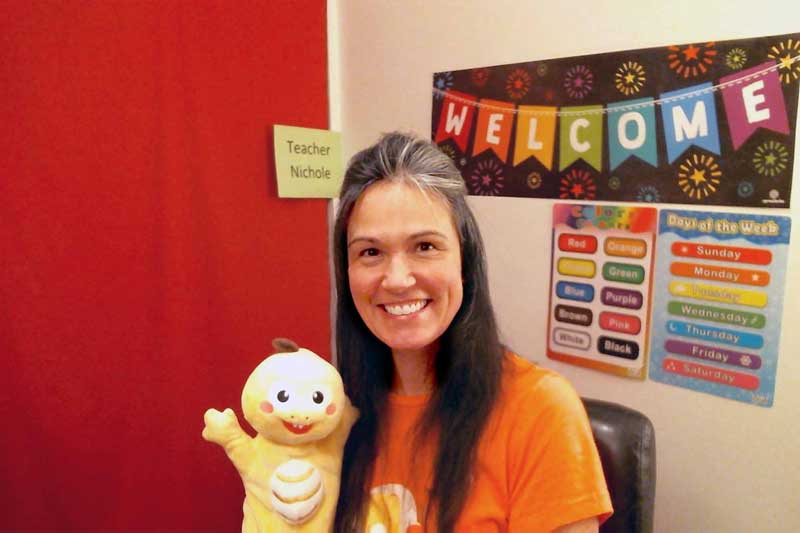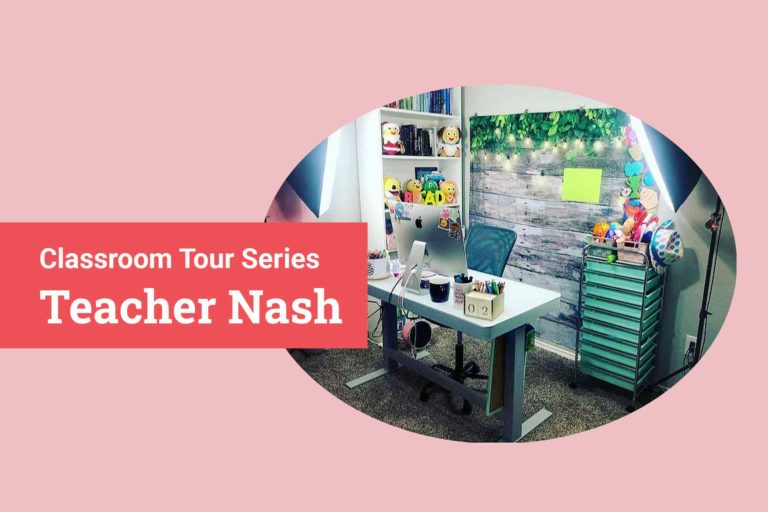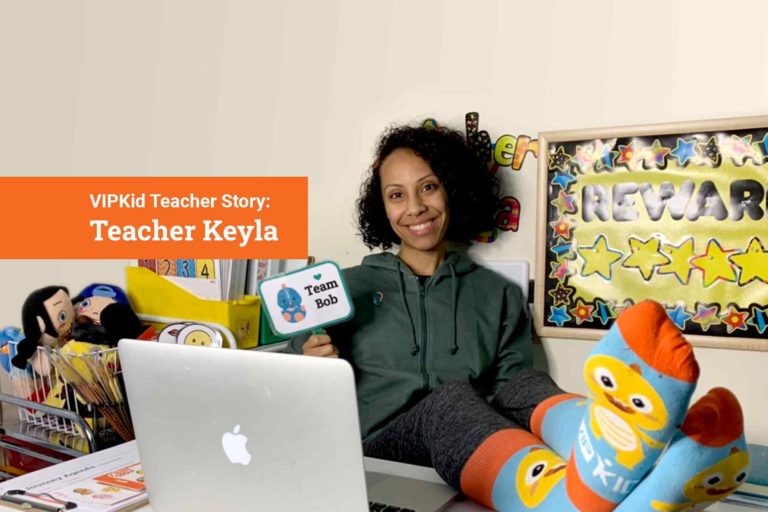Ready to start teaching English online?
Teach with VIPKidThe VIPKid community is filled with experts from all branches of the teaching world. One of those experts is VIPKid Teacher Nichole Jordan, a reading specialist with more than 20 years of teaching experience. Recently, we caught up with Nichole to talk about her top tips for improving reading comprehension, her experience as a reading specialist, the best books for learning English, her favorite VIPKid memories, and more!
Q: Can you tell us about your background, journey into education, and how you became a reading specialist?
A: I always knew I would be a teacher someday. I would always play school at home with my stuffed animals and family pet for much longer than anyone (or my dog, Muffin) would have liked. Once my career path became more clear, my passion for books and talking about reading and reading instruction naturally led to becoming a reading specialist. I initially hoped to become a professor of reading instruction at the university level for teachers who are pursuing a reading degree as well. It’s still a possibility, but VIPKid and my reading specialist position also remind me that working with students brings me such joy! Students and their successes are why I do what I do.
On a personal level, my husband and I love to travel. We’ve been to some amazing places and are always looking for ways to continue our journey. I love to explore and try new things, and I consider myself a very novice “foodie.” I always have a book in my hand, whether I am reading for school or for fun. Family, travel, books, and food… My heart is full.
Q: What does a reading specialist do?
A: A reading specialist often works with students from kindergarten through Grade 12 in small groups and one-on-one environments to help remediate skill deficits that students may have.
Reading specialists also coach teachers and support staff in a variety of ways. This coaching includes implementing the curriculum, providing professional development, modeling and co-teaching lessons, hosting discussion sessions on best practices, and providing effective feedback.
Teachers and specialists often work together to create extensive classroom libraries that are appropriate for the needs of the varied readers in the class. If a student needs additional support beyond what the teacher is able to provide, the student is often referred to the reading specialist for additional assessment and support to improve reading comprehension.
Q: What does a reading specialist focus on when assessing a child’s reading level?
A: There are a wide variety of tests and subtests that reading specialists use to assess a child’s reading level. The assessments that are used with a student depend on their age and skill level. With students who are not yet readers or are just beginning to read, such as those in kindergarten and Grade 1, we measure beginning reading skills, phonemic awareness, and phonics ability to determine what the student knows and what they need to work on. For students who are already readers, we ask them to complete a reading record to assess decoding skills, fluency, and comprehension.
Analyzing a student’s responses to questions and any errors they make is crucial to determine what the student does well and what they need to work on to be a more successful reader. With results from these assessments, a reading specialist can help in specific areas like vocabulary, comprehension, or anything else the student needs extra assistance in.
“One of the most impactful things that parents can do to help beginning readers is to sit with their child and have conversations about what is being read. Talk about the pictures and what they see, verbally say aloud what they are predicting or inferring about the story, and share how they make connections with the book and their life or other books they know.” – Teacher Nichole
Q: At what age should an ESL student begin to read?
A: With ESL students, reading level varies greatly. To determine whether or not a student should start reading, we would need to answer a few key questions. First, how much of the second language (English) has the student been exposed to? If there has been minimal language exposure, the student should not begin reading until they have had some experience listening to and making connections with the new language.
Second, how well does the student comprehend reading in their first language? Some students can often figure out the sounds of the letters or visually remember the words, but have difficulty putting them all together and understanding what they have read. This kind of student may be what’s called a “word caller” and not necessarily a reader. Reading is all about comprehension, and if a student can read and comprehend in their primary language, the transition to doing so in another language will be easier.
Q: How can parents help improve their child’s reading from a young age?
A: To help children improve their reading comprension at a beginner level, start with short words and sentences that have a lot of picture support. Slowly, your child will be able to move on to short books that have a sentence on each page.
Comprehension is the most important aspect to reading, so once your child finishes reading, ask them to tell you all they can remember about the story. One of the most impactful things that parents can do to help beginning readers is to sit with their child and have conversations about what is being read. Talk about the pictures and what they see, verbally say aloud what they are predicting or inferring about the story, and share how they make connections with the book and their life or other books they know. Over time, you’ll notice how their thinking changes as they read more and acquire new information.
These discussions and interactions help the learner associate positive feelings with reading, and it increases the bond between a parent and their child through quality time spent together.
Q: In your experience, how do young students in the United States usually learn to read?
A: Some reading researchers say that students need 1,000 hours exposure to books before they can successfully learn to read. In the United States, kids usually begin to learn how to read by climbing into the laps of their loved ones and being read to. Through this, young children learn how to hold and turn the page of a book, how pictures help us understand a story, and that a story remains the same each time you read it. Teachers can often tell which students have been read to by adults on the first day of school, because these students have interest in books and want to share their thinking with others.
Early learners begin to associate the sounds they hear in words with the letters they see in print. Once sounds are learned, they put those sounds together to form words. Sight words are gradually introduced. Students find the words in text and practice writing them in authentic sentences they write.
Q: How do you help students whose reading levels are not on-par with their grade level?
A: As a reading specialist, working with students who have some reading difficulties or who are not reading at grade level is what I do. It happens all the time and for varying reasons. As soon as a student is showing signs of falling behind their grade-level peers, I provide support in a number of ways. I may provide support to the classroom teacher, or if further remediation is needed, I may work with the student one-on-one or in a small group.
We begin by looking at assessment data and any discrepancy in how the students are performing. If it is determined that more instruction is necessary, the student will be assigned to a group based on what they need. It could be a group to work on phonemic awareness, phonics or decoding, comprehension, or vocabulary skills. Other students may join a group to work on fluency. Students stay in a small group as long as they need support. Data is constantly collected and that data is used to determine the next steps.
“The more a student reads, the better the readers they will become. If a young learner is working to improve their skills, he or she should read something that is of high interest to them.”- Teacher Nichole
Q: For young readers, what are some of the best books for reading comprehension?
A: The number one way to become a better reader is to read… a lot! The more a student reads, the better the readers they will become. If a young learner is working to improve their skills, he or she should read something that is of high interest to them. We try to ensure that classroom libraries offer a plethora of choices of genres, areas of interest, and reading levels. I have many favorite books and authors. My favorites depend on the purpose, but I’ll list a few.
Once students are in late first and early second grade, The Elephant & Piggie books by Mo Willems, the Mercy Watson series by Kate DiCamillo, and of course James Dean’s Pete the Cat books are some of the favorites of new readers.
More experienced readers tend to enjoy Mary Pope Osborne’s Magic Tree House, the Notebook of Doom series by Troy Cummings, and any number of books by Dav Pilkey. If you’re looking for nonfiction for these readers, the I Survived series by Lauren Tarshis and Jerry Pallotta’s Who Would Win are widely enjoyed.
Once a young student reaches a certain level, they can begin to delve into deeper chapter books. The One and Only Ivan by Katherine Applegate and Wonder by R.J. Palacio are two of my favorites to start with. I love to use books by Cynthia Rylant, Eve Bunting, and Patricia Polacco to model comprehension strategies and encourage deep thinking. I often refer to these treasures as “Heart Books.”
I could go on and on, but these are some of my favorites to start with for each level!
“Find something you love and are interested in! When I start working with a struggling reader, I start with a conversation and use an interest survey to determine what they are and are not interested in.”- Teacher Nichole
Q: What advice would you give a student who is struggling with reading?
A: Find something you love and are interested in! When I start working with a struggling reader, I start with a conversation and use an interest survey to determine what they are and are not interested in. This helps guide future selections.
Once I find an area of interest for a student, there are plenty of ways to engage with the book beyond simply reading words. Books with pictures often inspire more wonder and curiosity, and give readers context to what’s happening in the story. Talking with students about what they read stimulates interest and helps improve comprehension skills. If a student is struggling with their reading speed, have them listen to an audiobook version while they follow along with their own book. The key for the student is reading a lot of material with a high success rate.
But it’s important to note that you don’t only have to read books! Things like articles, pamphlets, websites, and blogs are helpful to engage the reader with something they’re interested in.
“I use reading specialist techniques in my VIPKid classes all the time! One of the strategies I use most often is a form of total physical response (TPR). When learning vocabulary, the student and I both perform movements associated with the sounds and words to help the student learn and recall what they’ve learned in the future.” -Teacher Nichole

Q: How has your background as a reading specialist helped with your teaching on the VIPKid platform?
A: I use reading specialist techniques in my VIPKid classes all the time! One of the strategies I use most often is a form of total physical response (TPR). When learning vocabulary, the student and I both perform movements associated with the sounds and words to help the student learn and recall what they’ve learned in the future.
I also use other reading specialist tactics when I’m teaching English online. For example, to help students understand syllables, we count together the number of times their jaw drops when they say a word. I also vary the type of reading we might do in class (echo reading, independent reading, or following along) based on what would best benefit the student. I feel that my experience as a reading specialist helps me understand the appropriate level of support to give a student!
“I am so thankful for the personal connections I have made with students and families through VIPKid. I have learned so much about Chinese culture and heritage, and I’ve had the pleasure of working with some of the kindest and most generous people I have ever met.” -Teacher Nichole
Q: Do you have any memorable teaching moments with students from the VIPKid platform that you could share?
A: Oh my goodness… There are so many memorable moments; too numerous to count! Teaching with VIPKid is my favorite part of my day. I know the students have been working hard all day and that families have many choices in their VIPKid teacher, so I try my best to make every class enjoyable and fun!
I am so thankful for the personal connections I have made with students and families through VIPKid. I have learned so much about Chinese culture and heritage, and I’ve had the pleasure of working with some of the kindest and most generous people I have ever met. I even had the absolute pleasure of meeting several students when I traveled to China in 2019! Seeing a student I had watched learn and grow for years and being able to give them a real hug was the highlight of my career. These are the moments I will treasure forever!
We love hearing how Nichole’s unique perspective as a reading specialist helps her as an online English teacher with VIPKid, and we hope there are many more treasured moments in the future!
__
Earn $14-$22/hour from home with VIPKid
Want to share your teacher story with us? Reach out on Facebook, Instagram, or Twitter and you might just have your story featured on our blog!



